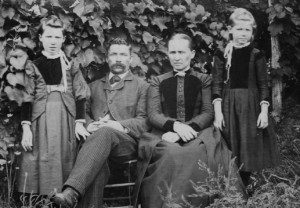 Travel back with me in time to rural Iowa. The year is 1850.
Travel back with me in time to rural Iowa. The year is 1850.
Meet Clem — a poor farmer scratching a living out of the rich black soil seven miles west of Cedar Rapids (population 1,700).
Clem spends six days a week working his fields, tending his livestock and repairing things that break. He labors 13 hours a day in mind-numbing regimen, mostly alone with his thoughts.
But on Sunday his routine changes. Clem dons his only suit, hitches a draft horse to the buckboard and takes his family into Cedar Rapids for church.
Clem loves church because it’s so different from the rest of his life. It’s the only time he hears music all week. He gets a much needed break from his isolation to see friends and exchange greetings. And for thirty precious minutes Clem listens to a sermon — the only new information he absorbs all week.
As Clem returns to the farm he discusses that sermon with his family. All week long Clem ruminates on the pastor’s words. When he’s not thinking about the sermon he’s humming hymns to lighten the drudgery of his routine. And his heart is lightened as he recalls the conversations he shared before and after services.
Church is enormously powerful in Clem’s life because it provides him with three things he desperately needs – music, ideas and socialization – things he can’t get anywhere else.
Fast forward to 2014.
Clem’s great-great grandson Carl lives in Des Moines, Iowa (population 206,000). Carl’s life is awash in music, ideas and socialization.
Carl hears music everywhere – in his room. In the car. In the mall. It blares from his radio, his TV and his even his phone. Music is the soundtrack of his life. He can hear music anywhere, any time, at practically no cost.
Carl is bombarded with hundreds of new ideas every day, served to him free via advertising and broadcast media. And if these weren’t enough, Carl can peruse millions of Web sites, thousands of online newspapers and magazines, and billions of hours of free videos on YouTube. Carl has access to literally millions of information channels – and the number expands daily.
And Carl is never disconnected from friends, thanks to social media, blogs, Facebook pages, Instagram feeds and text messaging. Carl sees people all the time – at work, or at one of Des Moines’ many bars, coffee shops, sports venues and shopping malls.
Grandpa Clem lived in an information and social desert. In 1850 it took a great deal of effort to access music, ideas and social networking. But grandson Carl lives in an information and social rainforest. Never in a lifetime could Carl assimilate even one percent of the music, ideas and social opportunities available to him.
Curiously, the local church seems unaware of these changes. Congregations still behave as if people are living in the information/social desert. We put together a weekly stage presentation with a dash of music, some spiritual information and some light conversation before and after, and then tell ourselves we’ve done our job.
We’re selling floppy disks in an era of 64gb iPads.
Some churches have responded by improving the quality of the presentation. Better music. More sophisticated lighting and sound. Hip, relevant sermons. Community groups and Bible studies.
What we haven’t realized is that no matter how much we improve the model, the model is still responding to the needs of grandpa Clem. In 1850 our product was completely unique. No one else offered what the church did. But in 2014, everyone offers the same things we do – better, faster and cheaper than we do.
We offer monologue sermons in a world that’s awash in multimedia. We offer a weekly singalong in a world where professionally produced music is ubiquitous. We offer light, chatty conversation in a world that produces more than a billion tweets and posts every week.
On top of this, we make it hard for people to access our product. Because we meet Sunday mornings, men must give up their entire weekends and travel to a building to receive what we offer. Meanwhile, our competitors offer music, ideas and socializing 24/7, accessible with a few taps on a touchscreen.
Men are very practical creatures. We get our needs met in the simplest, most convenient way we can. If dudes can get their ideas, music and socializing without attending a weekly meeting, that’s what they’ll do.
Is church still needed?
So does the church still have something to offer men in this brave new world? Yes.
Men still need Jesus. They still need love. They still need care. They still need forgiveness and salvation and peace. Men need to be heard and understood. They need to be accepted – and then challenged.
We still have what the world is dying for. But they way we deliver our Gospel is going to have to change.
How can existing congregations shift their focus from information transmission to loving people? How can we create new manifestations of church that are more effective at loving people?
That’s the subject of next week’s post. Stay tuned.
For more information on David Murrow and Church For Men, visitwww.churchformen.com. You can contact David, check his speaking calendar, order autographed copies of his books and DVDs, and learn lots of ways to make your congregation more welcoming to men and boys. See you there.












